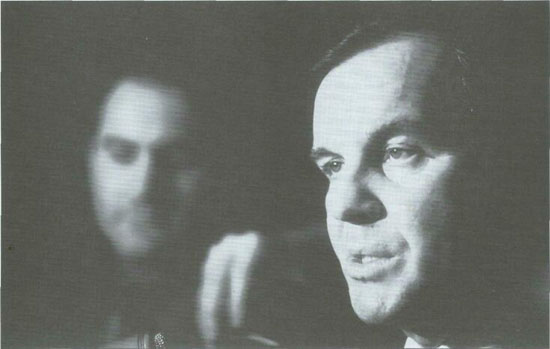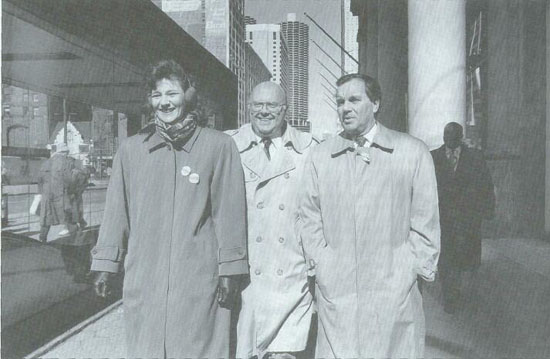 |
Home | Search | Browse | About IPO | Staff | Links |
 |
Home | Search | Browse | About IPO | Staff | Links |
|
By ROBERT DAVIS

The dilemma of long division: Chicago Mayor Richard M. Daley decides to go it alone Chicago voters will nominate candidates for that city's top offices this month. But they'll go to the polls without the benefit of a mayoral slate. For decades, Chicago mayors have anointed running mates for the lesser city offices of clerk and treasurer. Such slating has been used to reward loyalists and to acknowledge emerging interest groups. But with Chicago's changing demographics, there are more interest groups than posts to hand out, and endorsements are just as likely to make enemies as friends. Four into two won't go. While the Chicago City Council has 50 members, making it one of the largest municipal legislative bodies in the nation and capable of representing virtually every ethnic, political and pressure group in the city, when it comes to choosing citywide officers, the choices come down to three. Every four years, the nearly three million residents of Chicago are asked to choose three people who will represent all of them equally and fairly: the mayor, the city clerk and the city treasurer. Twenty-five years ago, the political mathematics was a lot simpler. Three offices — three white guys, one of them an Irishman from Bridgeport, the other two either colorless apparatchiks or political loyalists. But today's New Math has been creating some New Prob- 18/February 1995/lllinois Issues lems for the people who decide Who's Who in the Windy City. The 1960s created a powerful political interest group in the city's growing and awakening African-American population. Old-time political minions like Ralph Metcalfe went from being Democratic machine hacks to newly enlightened activists, questioning the political rule of the Democratic organization in general and the powerful dynasty of Richard J. Daley in particular.
Daley had achieved almost total control of Chicago by breaking his promise to surrender the chairmanship of the Cook County Democratic Party after being elected mayor. Since taking office in 1955, he had passed the treasurer post around the party like an hors d'ouevre tray, replacing his first running mate, prominent businessman Morris B. Sachs, with functionaries like Sidney Deutsch, Edmund Curry and William Milota, or, in 1967, well-known man-about-town Marshall Korshak. The other citywide post belonged to Polish political king John Marcin, one of Daley's closest political allies. Marcin, who referred to Daley as "Himself," was free to enjoy that office for as long as "Himself" was still around. By 1971, however, the black neighborhoods of Chicago were roiling with dissent and unrest in the wake of the death of Black Panther leader Fred Hampton; the West Side had erupted in riots following the death of the Rev. Martin Luther King Jr. in 1968; and Daley was perceived by some as a loutish racist, spawned by the roughneck Hamburg Social and Athletic Club in the tightknit and racially isolated Bridgeport neighborhood. Being the consummate politician, Daley saw what he had to do. Marcin, of course, was safe in his city clerk post, but Daley reached out and chose Joseph Bertrand, a well-known former University of Notre Dame basketball star and an up-and-coming banker-businessman on the city's South Side, to become the first black city treasurer and, of course, the first black citywide official in Chicago. And so it remained for more than 20 years: Chicago's version of long division when divvying up the political power. The Poles, Chicago's largest white ethnic group, got the city clerk's office; the blacks, Chicago's largest and fastest-growing racial group, got the city treasurer's office. When Jane Byme was elected mayor in 1979, a new factor entered the formula. Much has been made of the Year of the Woman in this decade, but it was in 1979 when women joined angry blacks and disgruntled white ethnics to elect Chicago's first woman mayor. Women, largely ignored by the Democratic political machinery, became a force to be reckoned with. And each decade the U.S. Census figures could not be ignored. The Hispanic population was growing in Chicago. Unlike California, where Mexicans made up most of the Latino population, or New York, where Puerto Ricans migrated, Chicago's Hispanic bloc was diverse, with old-time Mexican neighborhoods and new Puerto Rican barrios springing up in formerly Polish, Italian or German communities. Blacks, Poles, Hispanics and women. Four powerful voting blocs, and only two jobs to offer them. That was the dilemma Richard M. Daley faced in 1991, when, after serving two years of the unexpired term of the late Mayor Harold Washington, he had to forge his own ticket. He picked Walter Kozubowski for clerk and Miriam Santos for treasurer.
Walter Kozubowski was the Polish American chosen by acting Mayor Michael A. Bilandic to run with him in 1979. Even though it was well known that Kozubowski had been under a federal investigation for years for reportedly padding his office payroll and committing a variety of other corruption offenses, Daley chose to stick with "The Koz" in his 1991 election bid. Miriam Santos was an attractive young lawyer who had
February 1995/Illinois Issues/19
worked for Daley in the Cook County state's attorney's office. Santos was bright, outgoing, ambitious, and, best of all, a political "two-fer." She was a woman and she was Hispanic. So Daley had a Polish city clerk, albeit a soon-to-be-indicted one, and a Latina treasurer. He didn't have a black running mate, of course, but the political thinking in the brain trusts of the mayor's office in 1991 was that Daley was going to have a black mayoral opponent anyway, so those votes weren't going to go to Daley no matter whom he chose to run with. Like all plans that are too good to be true, Daley's plan was too good to be true. A year into his term, Kozubowski was indicted for a series of federal corruption crimes. He pleaded guilty in a plea bargain, refusing for several days to resign until Daley publicly threatened him. Daley was left without a city clerk, Polish or otherwise. Ultimately, he picked retired, unblemished businessman Ernest Wish, a well-meaning soul whose first official act was to vow that he wouldn't seek election to the office when it officially opened up. The Miriam Santos choice presented a different kind of problem, and a much more serious one. Although originally a Daley protege, Santos clashed early on with the mayor's top advisers, prompting them to make an ill-advised effort to remove her from her statutory seats on two city pension boards. She blasted the Daley administration for trying to derail her, and eventually won the support of Daley foe, Gov. Jim Edgar, a Republican who was more than glad to take Santos' side by refusing to remove her from the boards. The scars from that battle never healed, though, and Santos has, in effect, been cut off from the mayor's office. So here was Richard M. Daley at the end of 1994. Two running mate jobs to fill — a city treasurer slot now occupied by an ambitious Hispanic woman, a city clerk slot wide open, and at least four politically potent forces to satisfy. So here is what Richard M. Daley did at the end of 1994. Nothing. While his late father, as both mayor and chairman of the omnipotent Cook County Democratic Organization, reveled in slate-making, pointing his scepter at potential candidates, anointing them sometimes for jobs they didn't even want, this Mayor Daley has chosen the easy way out, and that, sometimes, is the hardest way of all. Richard M. Daley is running alone, he says. Privately, he snorts that he doesn't care who the city clerk or city treasurer is anyway. During his six years in office, Daley has taken away

Photos hy Bill Slamets In his 1991 re-election campaign, Mayor Richard M. Daley picked a Polish American, Walter Kozubowski, to run for city clerk and Miriam Santos to run for city treasurer. Santos was an attractive young Hispanic lawyer who had worked for Daley in the Cook County state's attorney's office.
20/February 1995/lllinois Issues
most of the clerk's duties, knocking the once patronage-rich ranks of employees to an even 100, most of them low-paid clerks who hand out vehicle stickers and business licenses. The city treasurer's office has only 23 employees. The primary day-to-day duties of that job are to receive money coming to the city and deposit it in banks for safekeeping. As the Orange County, Calif., bankruptcy has shown, that job can be done badly, but city law prevents such speculative investing in Chicago. The treasurer's job is mostly to play by the rules and keep quiet about it. So Daley has said he will back no one in either race in the February 28 primary and the April 4 general election. Most people don't believe that, and expect Daley to lend some of his workers or considerable campaign fund to help people down the line, but publicly at least he has taken a hands-off approach. Ald. Lawrence Bloom (5th), the dean of the Chicago City Council independents, has decided to run for treasurer. Two political neophytes have also filed petitions. Although Daley can't actually be a winner in this race, he can't be a loser either. If Bloom wins, Daley has gotten rid of the always possible threat of a challenge from Santos. If Santos wins, Daley can point to a female Hispanic in his government, and be rid of gadfly Bloom in the process. Outgoing Ald. James Laski (23rd), who has fought with Daley and with his own sponsor, U.S. Rep. William Lipinski, has made a fragile peace with both, and seems to be the candidate the mayor would most like to see win the clerk's office. Not that Daley is a Laski fan, but the only other big name in the race is Illinois state Sen. Rickey Hendon, who was a nuisance for Daley as an alderman and continues to fan racial flames in his West Side power base. And Laski is Polish. So is another clerk contender, T. Ron Jasinski-Herbert, the host of the Polonia Today television show that pops up regularly on double-digit channels and is watched in the Polish neighborhoods where Daley hopes to garner big vote totals. With challenges and last-minute changes of heart, the final field of candidates in any of the citywide races (even for the mayor's job) could change almost up to Election Day. But one thing appears obvious in this strange election year. The Old Math is dead. Faced with the impossible task of serving up a limited political pie with too many open mouths at the table, Daley and the increasingly insignificant remains of the once-powerful Democratic political organization, have chosen instead to announce that it's buffet time, that it's every man (or woman) for himself (or herself). Daley plans to grab the biggest plate and the first spot in line, and everybody else can get in behind him and try for what remains. It may be a political gamble, but to Daley and his aides it seems to be the only strategy that can be followed these days without causing political damage. But with no political chits to collect later, Daley may find that the buffet approach will make him no friends either. The reality is this: At buffets, no one tips the waiter. * Robert Davis, a City Hall reporter/or the Chicago Tribune, covered Chicago Mayor Richard J. Daley, and every mayor since.
February 1995/lllinois Issues/21
|
|
|